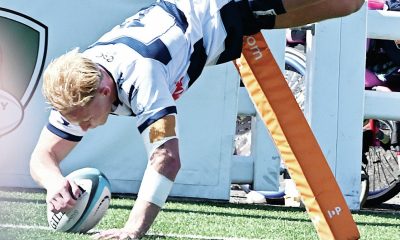
 What a start to the Six Nations! All the matches brimmed with pace, power and pathos, from the first to the last, with each game displaying the qualities that makes this sport so special.
What a start to the Six Nations! All the matches brimmed with pace, power and pathos, from the first to the last, with each game displaying the qualities that makes this sport so special.
Wales versus Italy was supposed to be a one-way points festival for the Welsh as they sought to ensure that if the Championship relied on a points difference, they had enough from this game to guarantee success.
Under Jacques Brunel, the Italians are slowly becoming a more competitive side and now have a number of world class players including Edoardo Gori, Martin Castrogiovanni and the perennial Sergio Parisse – but that is no excuse for the Welsh.
Gatland picked the strongest team available to him and will know that if the Welsh are to achieve their dream of winning a third successive Six Nations Championship they will need to improve dramatically – especially after yesterday’s mauling by Ireland.
England’s game in Paris was a cracker with both teams having their ups and downs before the French scored a very good try to snatch victory from the jaws of defeat that would have surely cost Philippe Saint-Andre his job.
The forward confrontation was only just over-shadowed by the mastery of the French backs who proved an old saying wrong in that forwards win games but backs decide by how many, as the England pack out-powered their French counterparts in most phases of the game.
The scrum was the one area where the French caused problems and won a series of penalties but it was always going to be difficult for 6ft 3ins Dan Cole to set properly against 5ft 8ins Thomas Domingo, fortunately Cole won’t face any more ‘shorties’ in the other games.
The new caps coped well and Owen Farrell had what I think was his best game for England so far – and given the chance, should be able to take the team onward and upward.
A lot has been made about the substitutions and whether or not they should have been made. Personally I don’t believe in substitutes unless there is an injury although they are very much a part of the modern game.
All the weekend games involved the use of substitutes, some successful, some not and every coach has to live with the decisions he made and it is wrong for past coaches or players to make post match criticisms especially when their own record has some dubious calls.
In the 1999 World Cup quarter-final against South Africa, Paul Grayson was subbed off for Jonny Wilkinson whose first act when he came on the field was to take a penalty awarded just before the substitution that would have brought England back into the game.
Coming cold off the bench, Wilkinson missed the kick and the game was lost.
Personally, I would have allowed Grayson to kick the penalty and then made the substitution but that is with hindsight and I don’t know if England would have won if Wilkinson’s kick had been successful.
I have to say I don’t buy into all the talk about the England players being angry and hurting or that they need to use the defeat as motivation for the rest of the tournament. As a player when the team lost I never felt angry or hurt, disappointed yes, but as long as I could say that I had played as well as I could, that was enough. Hurt or anger never entered my mind.
As for using the loss as motivation for the other games, why would they need to?
All players lucky enough to be picked for their country have what is the ultimate motivation – they are playing international rugby, something that most rugby players would give their right arm for.
Not only that, they are facing rivals that share the same motivation with the added bonus of trying to be a team that beats England, something that every Celtic player dreams of and every Englishman knows. Why would a loss to the French offer more motivation than that?
The fuss about the Murrayfield mud patch does bring a smile to my face, having played on a lot worse pitches over my years in the game.
Playing against Bath when the Avon was high always transformed the pitch into a quagmire but that never stopped the Bath machine from scrummaging most teams off the park. And the old Cardiff Arms Park wasn’t exactly a bowling green even back in the 70s when Phil Bennett used to dance his way through the opposition defence.
Back in the dark days before professionalism one of the many skills required by rugby players was an ability to adapt their game according to the conditions, in other words have a plan B should you be unable to put plan A into action for any reason, including the state of the pitch.
Some people may say that watching a game played on a poor surface will be less entertaining, but if the state of the pitch were seen as an aid to Scotland winning the Scots would be foolish to make it better for their opposition.
As the financial rewards from competing in the Six Nations are dependent on where each team finish in the table, I would accept that any little advantage that Unions can give to their team when playing at home should and must be taken.


Latest News
Super Rugby Americas: Round Ten Review

British and Irish Lions
British and Irish Lions: Biggest winners and losers from Andy Farrell’s selection
























You must be logged in to post a comment Login